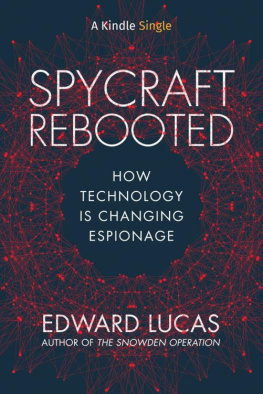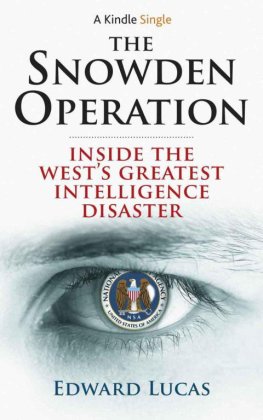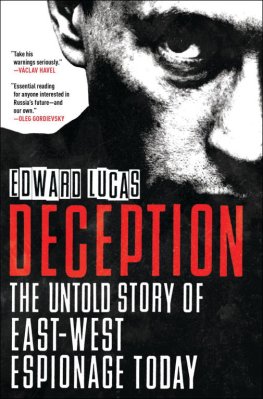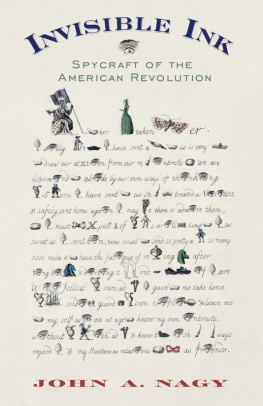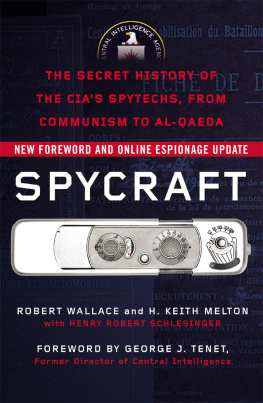Edward Lucas - Spycraft Rebooted: How Technology is Changing Espionage (Kindle Single)
Here you can read online Edward Lucas - Spycraft Rebooted: How Technology is Changing Espionage (Kindle Single) full text of the book (entire story) in english for free. Download pdf and epub, get meaning, cover and reviews about this ebook. year: 2018, publisher: Amazon Publishing, genre: Detective and thriller. Description of the work, (preface) as well as reviews are available. Best literature library LitArk.com created for fans of good reading and offers a wide selection of genres:
Romance novel
Science fiction
Adventure
Detective
Science
History
Home and family
Prose
Art
Politics
Computer
Non-fiction
Religion
Business
Children
Humor
Choose a favorite category and find really read worthwhile books. Enjoy immersion in the world of imagination, feel the emotions of the characters or learn something new for yourself, make an fascinating discovery.
- Book:Spycraft Rebooted: How Technology is Changing Espionage (Kindle Single)
- Author:
- Publisher:Amazon Publishing
- Genre:
- Year:2018
- Rating:4 / 5
- Favourites:Add to favourites
- Your mark:
- 80
- 1
- 2
- 3
- 4
- 5
Spycraft Rebooted: How Technology is Changing Espionage (Kindle Single): summary, description and annotation
We offer to read an annotation, description, summary or preface (depends on what the author of the book "Spycraft Rebooted: How Technology is Changing Espionage (Kindle Single)" wrote himself). If you haven't found the necessary information about the book — write in the comments, we will try to find it.
Spycraft Rebooted: How Technology is Changing Espionage (Kindle Single) — read online for free the complete book (whole text) full work
Below is the text of the book, divided by pages. System saving the place of the last page read, allows you to conveniently read the book "Spycraft Rebooted: How Technology is Changing Espionage (Kindle Single)" online for free, without having to search again every time where you left off. Put a bookmark, and you can go to the page where you finished reading at any time.
Font size:
Interval:
Bookmark:

OTHER TITLES BY EDWARD LUCAS
The New Cold War: How the Kremlin Menaces both Russia and the West
Deception: Spies, Lies and How Russia Dupes the West
Cyberphobia: Identity, Trust, Security and the Internet
The Snowden Operation: Inside the Wests Greatest Intelligence Disaster

Text copyright 2018 by Edward Lucas
All rights reserved.
No part of this work may be reproduced, or stored in a retrieval system, or transmitted in any form or by any means, electronic, mechanical, photocopying, recording, or otherwise, without express written permission of the publisher.
Published by Amazon Publishing, Seattle
www.apub.com
Amazon, the Amazon logo, and Amazon Publishing are trademarks of Amazon.com, Inc., or its affiliates.
eISBN: 9781503957459
Cover design by RBDA Studio
To C.D.S. and colleagues
CONTENTS
Introduction
The piano player in the canteen barely attracted attention from the masters of revolutionary Petrograd. If they bothered to speak to him at all, they would notice nothing unusual in his destitute appearance and accentless Russian. They would toss a few coins towards him, eat their meals and resume their work of hunting down spies and counter-revolutionaries. As civil war raged across Russia, the capital city was rife with informers, and run by a paranoid and ruthlessly violent clique of fanatics. It was the most dangerous place in the world to be a Western spy.
Yet had the Chekathe Bolshevik secret policeonly known, their ultimate foe was sitting among them. Sir Paul Dukes, the greatest intelligence officer in the history of Britains MI6, ran a stunningly successful network of agents, wholly undetected in the years after the 1917 revolution. Dukes not only slipped into Russia unnoticed but for many months passed the Communist regimes most closely guarded secrets to spymasters in London. He did this not while living in the sewers, or skulking in an attic, but hiding boldly in plain sight, as the pianist in the Chekas canteen: an excellent place for observation, and one which conveniently rendered him above suspicion or scrutiny.
That required audacity, ingenuity, meticulous attention to detail, and nerves, all of which he had in abundance. But his bosses did not worry about creating a watertight false identity that would enable him to cross the border without arousing suspicion. Nor did they provide him with gadgets and disguises. C, as Sir Mansfield Cumming, the first head of the Secret Intelligence Service, was known, told him simply:
As to the means whereby you gain access to the country, under what cover you will live there, and how you will send out reports, we shall leave it to you... to make suggestions.
Modern Russia is a far less frenetic and fearful environment. Yet replicating his achievements nowadays would be harder. The reasonthe subject of this bookis technology. The combination of ubiquitous data, limitless storage and formidable processing power make the inconspicuousness which lies at the heart of traditional spycraft risky as never before.

Documents prove our identity. But from the invention of printing until the creation of computerised databases, checking their authenticity was hard. In prisoner-of-war camps, inmates planning their escape would even create identity documents, laboriously, with pen and ink, using whatever paper was available. Even an imperfect forgery had a good chance of passing muster. Imperfections could be the result of careless printing. A suspect document could be checked against a central register, but that was a time-consuming manual process, involving sending telegrams and checking serial numbers. Comparing photographs is even harder: a few people have flukish abilities to remember large numbers of faces, but their talents are too scarce to be used for routine checks.
Dukes therefore needed only a few props, easily purloined or faked, to switch identities smoothly and convincingly. He would clean himself up, put on the right uniform and convincingly impersonate a soldier, party official or secret policeman.
His exploits are still on the curriculum at British and other spy schools. Modern spies study his people skills, survival instincts and grit. But modern technology would make copying his fieldwork insanely risky.
This book highlights the effects of pervasive collection, storage and processing of information about individuals. The result, especially in countries where the authorities have no qualms about breaching individual privacy, is a surveillance system in which spycatchers have a decisive advantage over their targets.
It is still possible to produce a fake identity document which will pass visual examination. That may allow an intelligence officer to check into a hotel, to hire a car or even to board a plane under an alias. But making sure that the forgery will fool computerised scrutiny, such as passport control, is much harder. Where was the document issued? Has it been reported stolen? Is the person to whom it was issued actually dead? All those questions are easier to answer thanks to electronic databases.
ID documents used to have only a photograph. Now they contain other biometric data, such as fingerprints and retina scans. These create huge problems for forgers. You may be able to change the photo in a passport, but can you also change the data on the chip it contains? Cameras and other devices can capture all physical featuresnot only faces, fingerprints and retinas, but also gait, posture and expressions. Computers can check those details against hundreds of millions of records. A single picture can be enough to identify someone definitively; once stored on a database it is available anywhere, forever.
A formidable array of other checks can also be brought to bear on international travellers. Every twist and turn of modern life leaves a trail of electronic interactions. We leave these digital traces not only with our active communicationsphone calls, text messages, emails and social-media posts, but also with our payments and movements. Faking this digital snails trail is hard; its absence is deeply suspicious.
As a result, a retired British intelligence officer says ruefully, Checks that used to take two weeks now take two minutes. So a latter-day Paul Dukes faces a dilemma. If you cross the border pretending to be someone else, you risk being caught, with unprecedentedly catastrophic consequences (of which more later). If you cross as yourself, then the watchers can look at most of your life history to see who you really are. The slightest sign that your identity is fake, or that you work for an intelligence service, means constant scrutiny for every minute of your time in Russia, China, Iran or whichever other authoritarian society you are trying to spy on. Everything you do is compromised; anybody you meet is in danger.
Few outsiders realise the scale of the revolution technology has brought to the spy world. Conversely, they make us more vulnerable to attack from hostile foreign powers such as China and Russia. It concludes by considering what defensive and offensive measures our democratic, law-governed societies should take in response.
Founded in 1703 by Peter the Great, St Petersburg was renamed Petrograd after the outbreak of the First World War because of anti-German sentiment. The Bolsheviks renamed it Leningrad in 1924, after the revolutionary leaders death. It reverted to St Petersburg after the Soviet Union collapsed in 1991.
Next pageFont size:
Interval:
Bookmark:
Similar books «Spycraft Rebooted: How Technology is Changing Espionage (Kindle Single)»
Look at similar books to Spycraft Rebooted: How Technology is Changing Espionage (Kindle Single). We have selected literature similar in name and meaning in the hope of providing readers with more options to find new, interesting, not yet read works.
Discussion, reviews of the book Spycraft Rebooted: How Technology is Changing Espionage (Kindle Single) and just readers' own opinions. Leave your comments, write what you think about the work, its meaning or the main characters. Specify what exactly you liked and what you didn't like, and why you think so.

